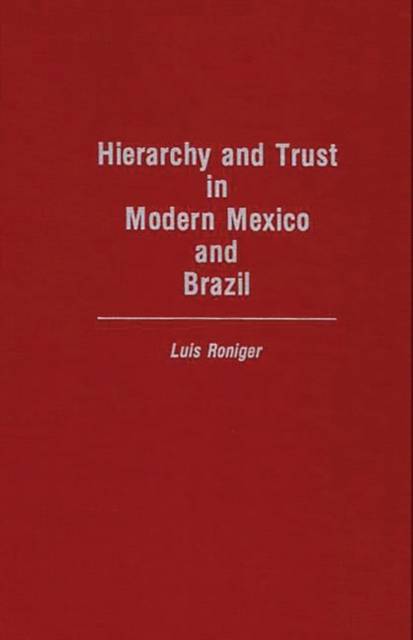
- Retrait gratuit dans votre magasin Club
- 7.000.000 titres dans notre catalogue
- Payer en toute sécurité
- Toujours un magasin près de chez vous
- Retrait gratuit dans votre magasin Club
- 7.000.0000 titres dans notre catalogue
- Payer en toute sécurité
- Toujours un magasin près de chez vous
Description
In this book, Luis Roniger offers a comprehensive and systematic discussion of the influence of clientelism and clientelistic relationships in social and political life in Mexico and Brazil. The author describes, analyzes, and compares clientelistic arrangements not only in terms of economic development and social differentiation, but also as a strategy of interaction and control over economic and political markets shaped both by structural factors and cultural patterns. Contrary to some theorists who argue that clientelism disappears following industrialization and modernization, Roniger sees clientelistic networks as both a distinct institutional pattern and a major model of structuring social exchange. Thus, he argues that it may be more reasonable to expect changes in the forms of Mexican and Brazilian clientelism, rather than its demise following economic development and political transformation.
Roniger begins with a general discussion of clientelism and trust, exploring the variety of clientelistic bonds, the conditions which lead to the emergence of clientelism, and the dynamics of Latin American clientelism. Following a chapter on the institutional contexts of Mexico and Brazil, the author presents an extended analysis of clientelism in the two countries. In each case, Roniger presents a historical overview, discusses the dominant characteristics of clientelism in that country, and examines clientelism in the rural, urban, labor, and political sectors. Subsequent chapters compare and contrast Mexican and Brazilian variants of clientelism. In the final chapter, Roniger places the Latin American data within its broader cultural context, comparing Mexican and Brazilian clientelism with hierarchical arrangements in Japan, Thailand, and India. He concludes that although political and social change in Mexico and Brazil has led to major transformations in clientelistic patterns, clientelism has been retained as an important element of social exchange in these societies. Sociologists, anthropologists, political scientists, Latin American specialists, and students of development will find Roniger's work and incisive portrait of Mexican and Brazilian institutional development and social realities.Spécifications
Parties prenantes
- Auteur(s) :
- Editeur:
Contenu
- Nombre de pages :
- 256
- Langue:
- Anglais
- Collection :
Caractéristiques
- EAN:
- 9780275936280
- Date de parution :
- 24-10-90
- Format:
- Livre relié
- Format numérique:
- Genaaid
- Dimensions :
- 156 mm x 234 mm
- Poids :
- 535 g

Les avis
Nous publions uniquement les avis qui respectent les conditions requises. Consultez nos conditions pour les avis.






